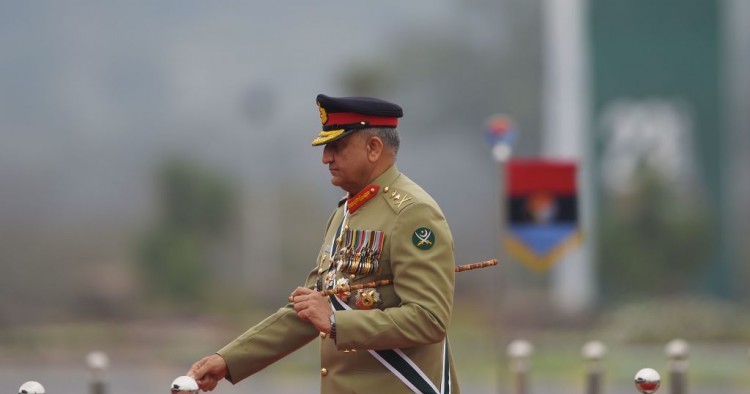All is not well in Pakistan-Saudi relations, which seem to have gone into a tailspin. In order to repair the fractured ties with one of the country’s strongest allies, Pakistan’s army has swung into action and its chief, Gen. Qamar Javed Bajwa, will travel to Saudi Arabia for talks this weekend. Although Maj. Gen. Babar Iftikhar, the spokesperson for Pakistan’s military, has insisted that Bajwa’s Saudi trip was previously planned and hence one should not “read too much into it,” the visit is being seen as an effort by Islamabad and Rawalpindi to repair ties with Riyadh.
Relations between Saudi Arabia and the Imran Khan-led Pakistan Tehreek-e-Insaf (PTI) government have been strained by the former’s unwillingness to organize a meeting of foreign ministers of the Organization of Islamic Cooperation (OIC) to target India, Pakistan’s arch rival, over the issue of Jammu and Kashmir following the abrogation of Article 370 of the Indian constitution and revocation of the region’s special status last year. Over the past few years, Saudi Arabia’s relationship with India has strengthened, and Riyadh’s unwillingness, or rather the OIC’s inaction, on raising the Kashmir issue has caused a lot of frustration in Islamabad.
Crossing a diplomatic red line, Pakistani Foreign Minister Shah Mehmood Qureshi recently asked the OIC to set a deadline for such meeting, arguing that, “If you [Saudi Arabia] cannot convene it, then I’ll be compelled to ask Prime Minister Imran Khan to call a meeting of the Islamic countries that are ready to stand with us on the issue of Kashmir and support the oppressed Kashmiris.” Not surprising, this ultimatum has irked the Saudis and negatively affected ties.
Qureshi’s unusually harsh tone against the Saudis, which have for decades been Pakistan’s key benefactor, is likely to have serious implications for bilateral relations. Pakistan has been forced by Saudi Arabia to pay back $1 billion. Since it did not have the money, Pakistan had to borrow it from China, which is rapidly becoming Pakistan’s main option on many international fronts. Riyadh has yet to respond to Islamabad’s request for a $3.2 billion oil credit facility, which is part of a $6.2 billion deal announced in 2018. Originally, the loan Pakistan received from Saudi Arabia was due to be repaid in installments later in 2020 and in 2021, while the deferred oil payment facility aimed at bolstering Pakistan’s external payments position.
Pakistan, in concert with several other countries including Turkey, Malaysia, and Qatar, had attempted to form an alternative OIC through a summit organized last year in Kuala Lumpur. The move was seen as a direct challenge to Saudi Arabia’s leadership in the Muslim world, and Riyadh was not happy with Pakistan’s involvement. The Saudis warned the Pakistanis that if they went ahead with the summit, they would take several punitive actions including cutting off all financial support and replacing Pakistani workers with Bangladeshis. Although Khan did not attend the summit, the cracks in bilateral relations had become visible.
When he later travelled to Malaysia in Feb. 2020, Khan said he regretted his inability to attend the summit, arguing that there was a misconception among some countries that it would divide Muslims worldwide. In addition to Riyadh’s unwillingness to side with Islamabad over the Kashmir issue, Pakistan’s refusal to join Saudi and Emirati forces in their military operations in Yemen in 2015, as it did not want to be dragged into the Saudi-Iran sectarian conflict, has been another bone of contention between the two partners.
Pakistan’s military enjoys far better relations with the Saudi leadership than the country’s political leaders do. Pakistani security personnel remain stationed in Saudi Arabia, ostensibly for training and advisory purposes. Even Prime Minister Khan himself used to be on good terms with Saudi Crown Prince Mohammed bin Salman not so long ago. His 2019 meeting with President Donald Trump was reported to have been arranged by Salman.
Realizing the gravity of the situation, Qureshi was reported to have twice called a press conference to clarify his earlier comments, but cancelled them both. The cancellations were seen to reflect the army’s assessment that it was an insufficient way to address what has become a significant low in Pakistan-Saudi relations. Not willing to allow the politicians to rock the boat, the military establishment has decided to take matters into its own hands.
Vinay Kaura, PhD, is a Non-Resident Scholar with MEI's Afghanistan & Pakistan Program, an Assistant Professor in the Department of International Affairs and Security Studies at the Sardar Patel University of Police, Security, and Criminal Justice in Rajasthan, and the Coordinator at the Center for Peace and Conflict Studies in Jaipur. The views expressed in this piece are his own.
Photo by FAROOQ NAEEM/AFP via Getty Images
The Middle East Institute (MEI) is an independent, non-partisan, non-for-profit, educational organization. It does not engage in advocacy and its scholars’ opinions are their own. MEI welcomes financial donations, but retains sole editorial control over its work and its publications reflect only the authors’ views. For a listing of MEI donors, please click here.













